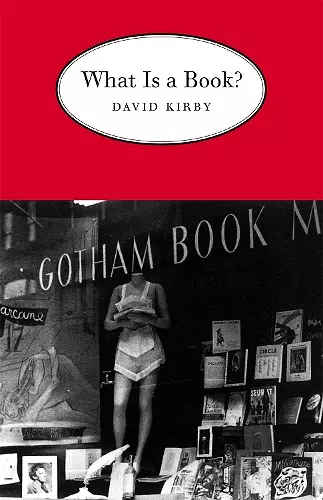What Is a Book?
Format:Paperback
Publisher:University of Georgia Press
Published:1st Nov '02
Currently unavailable, and unfortunately no date known when it will be back

In What Is a Book? David Kirby addresses the making and consuming of literature by redefining the four components of the act of reading: writer, reader, critic, and book. He discusses his students, his work, and his practice as a teacher, writer, critic, and reader, and positions his theories and opinions as products of "real" life as much as academic exercise. Among the ideas animating the book are Kirby's beliefs that "devotion is more important than dissection" and "practice is more important than theory."
Covering an impressive range of writers—from Emerson, Poe, and Melville to James Dickey, Charles Wright, Richard Howard, Susan Montez, and others—Kirby considers the evolution of critical theory from the nineteenth century to the late twentieth and explores the role of criticism in contemporary culture. Drawing from his experience writing poetry and reading to children at a local housing project, he answers two of his four central questions: "What is a reader?" and "What is a writer?" In the largest section of the book, "What Is a Critic?," Kirby demonstrates his passionate engagement with the function of the critic in literary culture and offers both overviews and close examinations of literary theory, book reviewing, and the historical background of criticism from its earliest beginnings. In the final section of the book, he addresses the question "What is a book?" with an examination of the reading preferences of older readers. Kirby's analysis of those responses, along with his own notions of the literary canon, is an insightful excursion into how books are valued.
Deeply learned and wonderfully entertaining, What Is a Book? is a lucid look at the whole of literary culture. Kirby makes us think about the books we love and why we love them.
After What Is a Book?, the study of a work of literature seems to me refreshed again, relevant, and full of pleasure; and the practice of writing about literature seems again public, useful, and productive. David Kirby's scholarship is impeccable, and his writing is smart, distinctively witty, and precise. I want to cheer.
* poetry editor of the Kenyon Review and Thomas B. Fordham Chair of Creative Writing, Denison University *Those of us who have been saving old magazines and newspapers with David Kirby’s essays and reviews can start clearing out the attic. Kirby’s unique combination of learning, wisdom, and the whole range of humor from the sly smile to the belly laugh is even more gratifying and pleasurable when his articles are collected in a single volume than when encountered one by one. Through his readings of two centuries of American fiction, poetry, and criticism, Kirby answers his own question, ‘What is a book?,’ with a nuanced, comic, and profound account of what it means to be human.
* author of Early Auden and Later Auden *Kirby's book is full of interesting principles, hard-earned on the front lines of academia.
Rather than taking on the book's physicality, David Kirby uses lists of favorites to answer the question What Is a Book? in the title piece from his new collection of critical essays. Kirby finds that for most people 'what counts is the personhood, not of the author, but of the book'—that novels can contain, and become, the most reliable figures of our lives. Others among the 17 essays here wonder "Is There a Southern Poetry?" and "What Is a Critic?," and come up with equally thoughtful responses.
Gifted with a fluid historical sensibility and a quintessentially American openmindedness, Kirby writes with nimbleness and precision about Melville and James, Charles Wright and Richard Howard, and children who love to be read to. . . . Anchored by four sparkling "what is" inquiries into the nature of the reader, the writer, the book, and the critic, this altogether enjoyable, enlightening, and reassuringly human collection radiantly celebrates our unceasing love and need for books.
Academically rigorous yet emotionally vigorous, these essays hit the right tone to interest general readers as well as specialists. Kirby's well-oxygenated prose ultimately clears our heads for good reading, brightening our understanding of why literature matters.
Kirby has gathered 17 essays so clear, so relevant, and far-reaching as to address all the major working parts of literature. Refreshingly witty, beautifully written, and accessible essays on topics that illustrate the nature of each of these "players" in the literary enterprise. An important and useful book that is also surprisingly pleasurable and entertaining to read; highly recommended.
Kirby's writing has flair and humor. He'll remind you of the best English teacher you ever had, if you were lucky enough to have a good one.
ISBN: 9780820324784
Dimensions: 216mm x 140mm x 18mm
Weight: 313g
240 pages